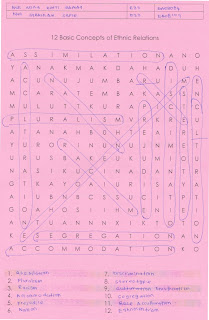Survey Questions
(Look East Policy)
DATE
4 November 2010
LECTURER
Mr. Ahmad Bin Ibrahim
1. Introduction
This report is one of the assignments for subject Ethnic Relations or Hubungan Etnik (UHM2022). This subject is designed to promote students unity and integration. This is achieved by involving students in field work and other dynamic team activities applying the basic concept and of ethnic relations in Malaysia.
Look East Policy as our research topic for this work activity. Here, some information about this topic, Look East Policy. In July 1981, Prime Minister Dato' Seri Dr. Mahathir bin Mohamad became the Prime Minister of Malaysia. After six months in his office, he announced an initiative to learn from the experiences of Japan (and Korea) in the nation-building of Malaysia. He considered that the secret of Japanese success and its remarkable development lies in its labour ethics, morale, and management capability. He felt a programme enabling that young Malaysians to learn in Japan would contribute to the economic and social development of Malaysia. For this purpose, Malaysia decided to dispatch their students to Japan, to study not only academics and technical know-how but also to learn labour ethics and discipline of the Japanese people.
This initiative is called "Look East Policy." The programme consists of two parts. The first is to send Malaysian students to Japanese universities and institutes of technology. The second is to send trainees to Japanese industries and training institutes. These programmes are funded by the Government of Malaysia, and the Government of Japan supports these programmes by sending Japanese teachers to Malaysia and also by sharing a part of its costs.
2. Report Review
In this part, we are going to review all the process doing this study form the beginning until the end of this report. The task is given by the lecturer, Mr. Ahmad Bin Ibrahim to conduct a survey on national policy in Malaysia. All groups have been asked to choose one policy from the national policies in Malaysia, so our group has decided to choose one policy which is Look East Policy. Our groups target is 50 persons consist of male and female students. Our group questions have been constructed in one form which made from Google spreadsheets. The spreadsheets are put in blog which is shirokuronoraifu.blogspot.com.
This survey form consists of 6 questions. 3 of them are subjective and the other 3 are objective s which is answer yes or no and true or false.
3. Analysis and Discussion
1. This policy are the continuity from the ‘Buy British Last’ policy that introduced by Tun Dr Mahathir in year 1981?

This question asked about general knowledge of respondents on the Look East Policy. Near 73% of total respondents answer true. While others 27% of respondents answer false.
2. This policy takes what countries as reference?
 In second question, 55% of respondents answer Japan as reference for this policy. While the others 36% answer Japan and South Korea as reference for this policy. 9% of respondents answer Japan, South Korea and China as reference for this policy.
In second question, 55% of respondents answer Japan as reference for this policy. While the others 36% answer Japan and South Korea as reference for this policy. 9% of respondents answer Japan, South Korea and China as reference for this policy.
About 55% of respondents answer economy, 9% of respondents answer social, 9% of respondents answer culture, 9% of respondents answer economy and social, and the rest 9% of respondents answer economy and culture.
4. The industrial training by technical and engineering student are also being introduced under this policy?

Majority of the respondents which is 100% say true.
This question asked about the reasons that the 4th Prime Minister introduces this policy.
As a result, 27% of respondents answer the West Country are no longer rely on the workers ability, 55% of respondents answer Malaysia have a capability to become industrial nation and 9% answer the East country are more rich than West country.
6. In your opinion, does this policy still relevant with our society nowadays?
 In this question, we ask the opinion of respondents about the relevant of this policy for nowadays. 82% of respondents answer yes. While others 18% answer no.
In this question, we ask the opinion of respondents about the relevant of this policy for nowadays. 82% of respondents answer yes. While others 18% answer no.4. Conclusion
According to this questionnaire, we believe Look East Policy is famous policy amongst Malaysian and still relevant for nowadays. Majority of respondents have knowledge about this policy.















